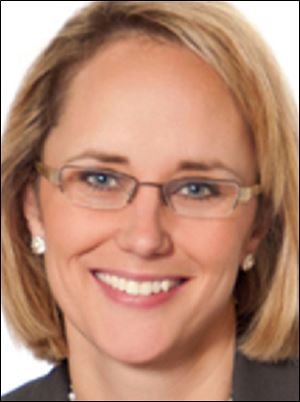
Findlay asked to make payroll tax permanent
Mayor pledged not to extend it, critics say
10/8/2012
First-term mayor Lydia Mihalik.
FINDLAY — Three years ago, in the midst of an economic slump city officials hoped was temporary, Findlay voters agreed to raise the local income tax by 0.25 percentage point for three years.
Those three years will be up at the end of the year, but on Nov. 6, the city is asking voters to make the increase permanent. They say the city needs the money to make up for other lost revenue, but opponents say the city has not done enough to tighten its belt. They are quick to point out that first-term Mayor Lydia Mihalik was elected after promising not to ask voters to renew the tax.
“Things have changed since that time,” Ms. Mihalik said. “Trust me, I wish we didn’t even have to have this conversation.”
She insists “this is not about playing politics with the city,” but says it's a matter of a decline in revenue that was not foreseen three years ago.
“This is about our operations. This is about the safety of our community and the quality of life we can enjoy as we move into the future,” Ms. Mihalik said. “It’s about sustaining the same levels of services we enjoy today.”
Last week, the anti-tax group Citizens for Findlay filed a complaint with the Ohio Elections Commission alleging, among other things, that the city and a group called Assurance for Findlay's Future incorrectly refer to the tax request as a “renewal” in campaign literature when the city is asking voters to make a temporary tax permanent, said Andy Douglas, a spokesman for the group.
The group also questioned a statement made by the mayor about how a city employee, communications director Jeremy Horne, would be “creating and distributing campaign literature,” which would be improper for him to do on city time, Mr. Douglas said.
“They're asking the people of Findlay to ‘trust us, trust our judgment,’ ” he said. “If we can't trust them to run a campaign properly, how can we trust them with $4.2 million of our money?”
At 1.25 percent, Findlay has one of Ohio’s lowest municipal income tax rates for a city its size. Bowling Green is at 2 percent. Tiffin is asking voters on Nov. 6 to increase its 1.75 percent income tax rate to 2 percent.
Ms. Mihalik said that when the temporary tax was approved, she did not know the state legislature would drastically cut local government funds. That reduction coupled with the loss of real estate taxes add up to about $2 million a year in lost revenue for Findlay.
In addition, she said, decisions were made before she took office that she had “no control over,” including a series of four 2 percent raises for the city’s nonunion employees — the last of which was rescinded by city council.
Because the 0.25 percentage point increase brings in about $4.2 million a year, the mayor has outlined some $6 million in cuts to be made if the tax fails. Among them, the city would lay off 23 of the city's 69 firefighters, close one of its four fire stations, lay off six police officers, and cut staffing in the parks, streets, cemetery, and zoning departments.
Mr. Douglas, a Findlay resident who called himself a businessman, assistant pastor, chamber of commerce member, husband, and father, said Citizens for Findlay is opposed to the tax because the city did not work to cut its budget over the last three years but instead expanded it. “The concern is not are we paying too high of a tax or too low of a tax, the concern is: Are you wasting our money?” he said.
The mayor begs to differ. She said that since she took office Jan. 1, the city has reduced its employee rolls to 321 full-time workers from 328. She combined the safety director and service director's post into one and replaced an administrative assistant in her office with a communications director "with a broader range of skills" who works in various city departments. Her administration also implemented changes in employees’ health-care plans that she believes will save more than $400,000 next year.
Fire Chief Tom Lonyo, whose department would take a big hit if the tax fails, said the east side of Findlay would be vulnerable to delays in response time because the city's newest fire station on the east side would be the one most likely to close. He said the public will have to decide how much risk it’s willing to absorb.
“The risks that the community experiences on an annual basis — fire, disaster, storms, you name it — will not decrease, but the capability to respond to those risks certainly will,” he said.
— Jennifer Feehan